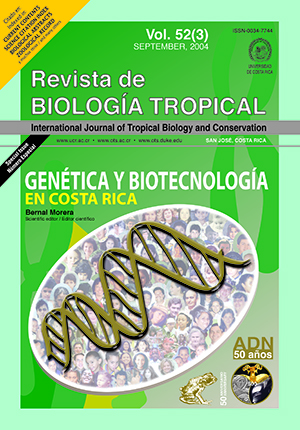Abstract
Genetic engineering and the food derived from genetically modified crops (GMCs) have been the center of debate worldwide, as has occurred historically with the advent of new technologies. Questions are derived from the potential impact of GMCs to the environment and the safety of the products to the consumers. In relation to the first inquiry, practice has been oriented to a case-by-case-study, according to the own characteristics of the GMC, in order to minimize its impact in the environment. Scientific studies in diverse latitudes of the world have demonstrated that GMCs in the market showed no adverse effects related to this issue. In relation to food derived from the GMCs, rigorous evaluation protocols have been developed and approved by FAO and WHO to guarantee the innocuousness of these products. Up to the moment, no contraindications for human health have been pointed out for the products that are available today in the market. In the particular case of Costa Rica, the country has established since the 90s a regulatory biosafety framework for the management of the GMCs, safeguarding the biodiversity of the country and the health of consumers. At the same time the country has made significant public and private investments in the field that allowed the country to obtain a leading position in biosafety in the region and genetic engineering research at national research centers. Any attempt to restrict or prohibit these activities in the country, will put in risk the previously described investment, will affect the generation of new knowledge for decision making and the leadership in the field, preventing the benefits derived from this promising technology.References
Arrieta, G., T. Quesada, E. Gamboa, E. Sánchez & A.M. Espinoza. 2002. Transgenic rice and gene flow assessment to wild and weedy rice species in Costa Rica. In C.R. Roseland (ed.). Abstracts of the OECD International Conference LMOS and the Environment, held in Raleigh, North Carolina, USA. pp. 69-79.
Arrieta-Espinoza G., E. Sánchez, S. Vargas, J. Lobo, T. Quesada & A.M. Espinoza. 2004. The weedy rice complex in Costa Rica. I. Morphologic study and relationship with comercial rice varieties and wild Oryza relatives. Genet. Resources Crop Evol.: en prensa.
Atanassov, A., A. Bahieldin, J. Brink, M. Burachik, J.I. Cohen, V. Dhawan, R.V. Ebora, J. Falck-Zepeda, L.
Herrera-Estrella, J. Komen, F. C. Low, E. Omaliko, B. Odiambo, H. Quemada, Y. Peng, M.J. Sampaio, I. Sithole-Niang, A. Sittenfeld, M. Smale, R. Valyasevi, Y. Zafar & P. Zambrano.. 2004. To Reach the Poor – Results from the ISNAR-IFPRI Next Harvest Study on Genetically Modified Crops, Public Research,
and Policy Implications. EPTD Discussion Paper No. 116. International Food Policy Research Institute IFPRI, Washington D.C. 57 p.
Borlaug, N.E. 2000. Ending world hunger. The promise of biotechnology and the threat of antiscience zealotry. Plant Physiol. 124: 487-490.
Burke, J.M. & L.H. Rieseberg. 2003. Fitness effects of transgenic disease resistance in sunflowers. Science
: 1250.
Conner, A.J., T.R. Glare & J-P. Nap. 2003. The release of genetically modified crops into the environment.
Part II. Overview of ecological risk assessment. Plant J. 33: 19-46.
Conway, G & G. Toenniessen. 1999. Feeding the world in the twenty-first century. Nature 402: C55-C58.
Daniell, H. 1999. New tools for chloroplast genetic engineering. Nat. Biotech. 17: 855-856.
Ellstrand, N.C., H.C. Prentice & J.F. Hancock. 1999. Gene flow and introgression from domesticated plants into their wild relatives. Ann. Rev. Ecol. Syst. 30: 539- 563.
Espinoza, A.M., A. Sittenfeld & S. Salazar. 2003. Developing transgenic rice at the University of Costa Rica:
perspectives and considerations for managing intellectual property rights. Interciencia 28: 111-117.
FAO & WHO. 2000. Safety aspects of genetically modified foods of plant origin. Report of a joint FAO/WHO
expert consultation on foods derived from biotechnology, WHO, Geneva, Switzerland, (Geneva: WHO). 37 p.
Hails, R.S. 2002. Assessing the risks associated with new agricultural practices. Nature 418: 685-688.
Haslberger, A.G. 2003. GM food: The risk assessment of immune hypersensitivity reactions covers more than allergenicity. Food Agr. Environ. 1: 42-45.
Huang, J., C. Pray & S. Roselle. 2002. Enhancing the crops to feed the poor. Nature 418: 678-684.
Kuiper, H.A., G.A. Kleter, H.P.J.M. Noteborn & E.J. Kok. 2001. Assesment of the food safety issues related to genetically modified foods. Plant J. 27: 503-528.
Kuiper, H.A. 2003. Comparative safety assessment for biotech crops. Trends Biotechnol. 21: 439.
Nuffield Council on Bioethics. 2004. The use of genetically modified crops in developing countries. A follow-
up discussion paper. Nuffield Council on Bioethics (ed.). London. p. 122.
Qaim, M., & D. Zilberman. 2003. Yield effects of genetically modified crops in developing countries. Science
: 900-902.
Quesada, T., J. Lobo & A.M. Espinoza. 2002. Genetic diversity and mating system of the wild rice species
Oryza Latifolia Desv. Genet. Resources Crop Evol. 49: 633-643.
Ramón, D. 2004. Presente y futuro de los alimentos transgénicos. Sistema 179-180: 31-40.
Sittenfeld, A., A. M. Espinoza, M. Muñoz, A. Zamora. 2001. Costa Rica, pp. 203-215. In G.J. Presley, &
L.R. MacIntyre (eds.). Agricultural Biotechnology: Country Case Studies-A Decade of Development.
CABI, UK.
Valdez, M, R. López & L. Jiménez. 2004a. Estado actual de la biotecnología en Costa Rica. Rev. Biol. Trop.
: en prensa.
Valdez, M., K. Madriz & P. Ramírez. 2004b. Establecimiento de un método de transformación genética de
maíz para conferirle resistencia ulterior a enfermedades virales. Rev. Biol. Trop. 52: en prensa.
Valdez, M, I. Rodríguez & A. Sittenfeld. 2004c. Percepción de la biotecnología en estudiantes universitarios
de Costa Rica. Rev. Biol. Trop. 52: en prensa.
##plugins.facebook.comentarios##

This work is licensed under a Creative Commons Attribution 4.0 International License.
Copyright (c) 2004 Revista de Biología Tropical


